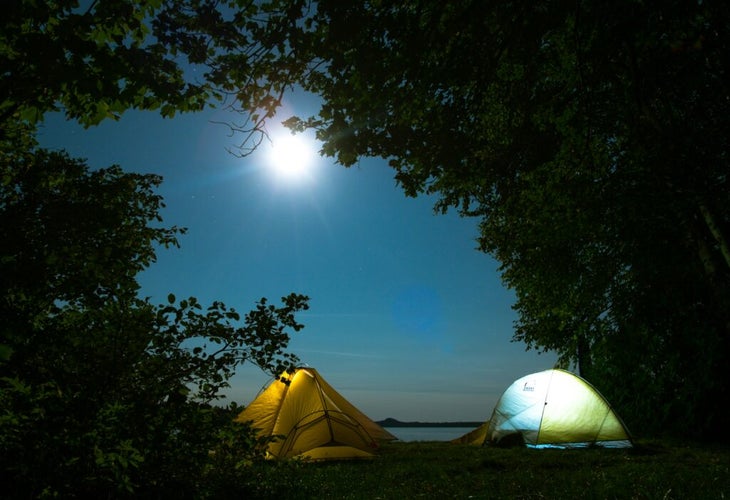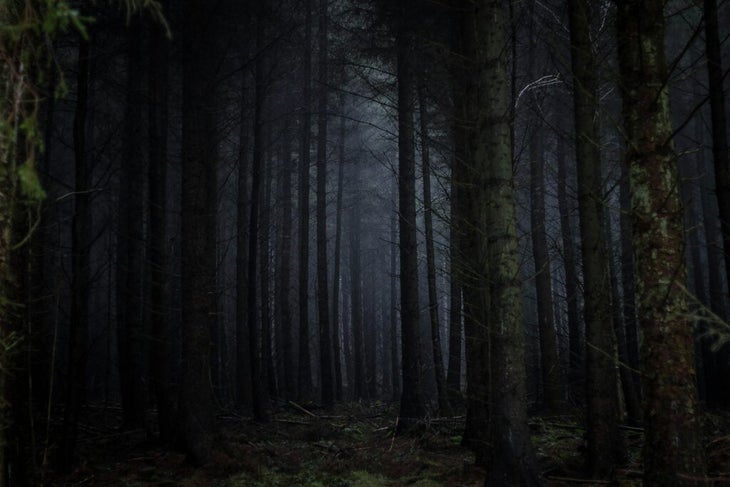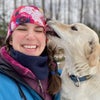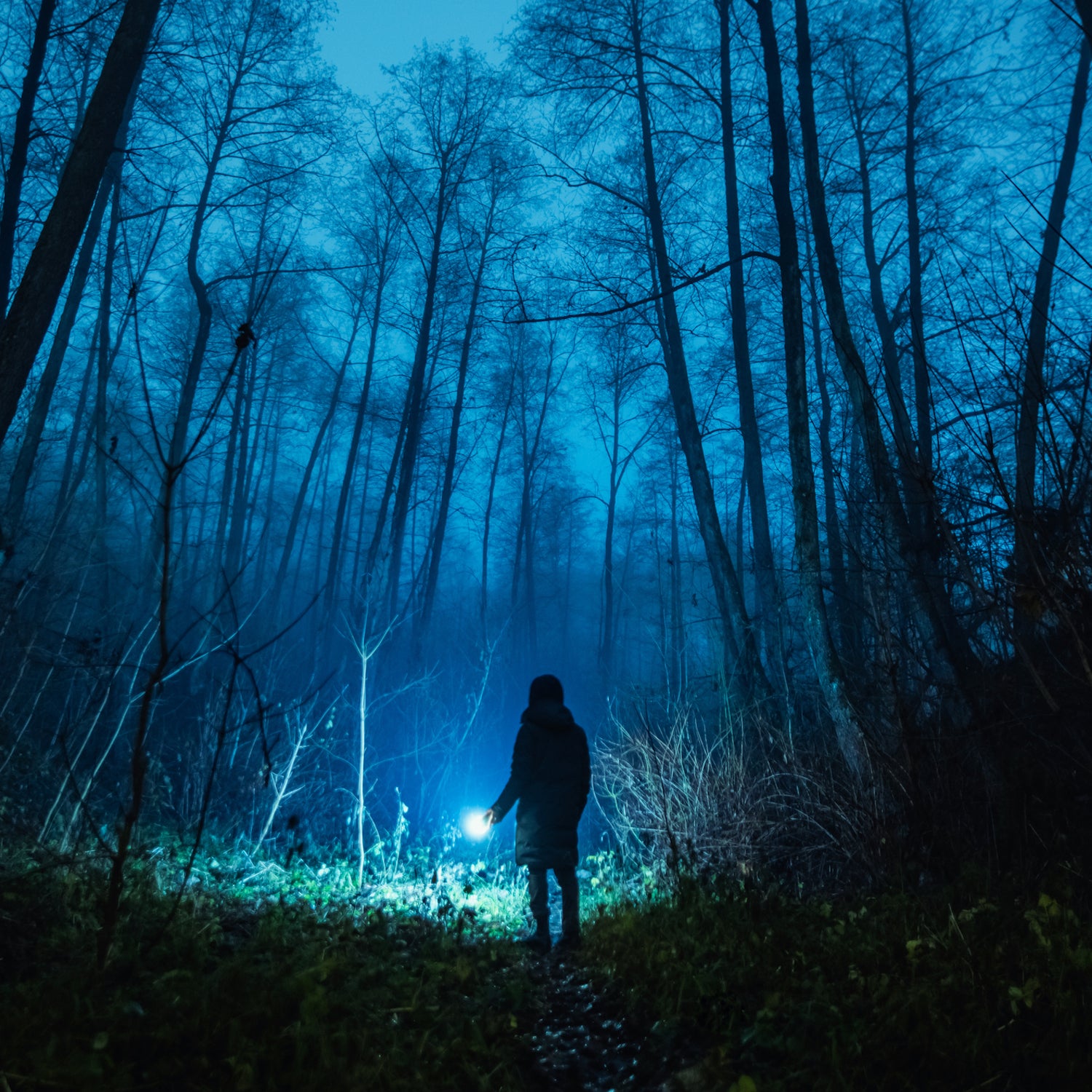In college, I brought guys into the forest at night because it was a place where I was less scared than they were. As a woman, dating—or even just being alone with a man—felt vulnerable. I wanted to flip the script.
I remember the second time in particular, with a man I really liked. We were a mile deep in the campus arboretum, following a trail through faint moonshadows and then, as the trees grew thicker, into a tunnel of black. My flashlight was dim. He held my arm as I led the way.
Something rustled in the dark to our right.
The man jumped a little, chuckled once, and grabbed my arm with his other hand. He squeezed.
“You nervous,” I said.
I sensed, rather than saw, his nod.
“What are you scared of?”
“What was that?” he said. He meant the rustle. Probably a mouse, I thought, but I didn’t answer. I imagined what he’d do if I said the flashlight had burned out. He wouldn’t panic, at least not outwardly, but his breath would quicken. He’d stay close; he’d squeeze my arm tighter. He’d trust me to lead the way out.
Still in blackness, I stepped back so we weren’t touching. He didn’t move. I thought about reaching back toward him, but instead I waited. Counted. One breath. Five, ten. When he still hadn’t moved or spoken, I stepped back toward him. Took one of his hands, then the other, and rose to my toes for a kiss.
“That would never have occurred to me,” he said later, back inside. “Going into the woods at night. I just never think of it as an option. I don’t know how you weren’t nervous.”
The secret was that I’d been nervous, too. But unlike him, I was used to it.

As a kid, I dreaded getting home at night because I hated walking in darkness from the car to the front door. I’d run past the roses and thuja trees by the driveway—fearing that at any moment, hands would reach from the thickets and grab me tight—and I didn’t calm down until I’d reached the bright artificial light of the entry. In the daytime, I loved being outside; I made passageways in the bushes, and tossed seeds to lure squirrels close. But at night, the yard turned into something different. It became a place I didn’t understand.
By my late teens, I spent most of my free time outside, bushwhacking through mountainsides and forests with a backpack and a map. I felt that my fear of the woods at night—though common, normal—was one of the last barriers between myself and the wild life I wanted. But the dark wasn’t dangerous, I told myself. It was just scary. And fear, I hoped, could be fixed. It was with that intention that I tried solo backpacking at 18, laying my sleeping bag on the moss at the edge of a mountain lake called Sick Water, where I planned to spend two days. But I panicked the first night–lying frozen, eyes open in blackness, barely able to breathe–and then hiked five miles home at three in the morning. I climbed into my own bed as the sun was rising, weak with relief.
Later that year, I tried again. It was winter. I skied uphill to the same lake, which was smooth and white, and found an open creek at the edge, barely a foot across and bounded with deep banks. I drank the water by cupping it in my bare hands, though the cold hurt my skin, and then I built a fire for warmth. I’d brought a book of poems—Prufrock, I think—to read for distraction, but I never opened the book at all. I didn’t need it. For some reason, that time I wasn’t afraid.
In retrospect, I think the cold helped my nerves. Winter’s always been my comfort. The world quiets; animals sleep. And the snow doesn’t lie. At times, lying in the darkness, I imagined creatures creeping toward me. But when the sun rose again, I saw from the untouched snow that they had not.
By the way, there was nothing sick about Sick Water. I don’t know how the lake got its name. It was good fishing, so maybe that’s why. Some fisherman tried to scare folks away and claim the whole lake for his own.
My husband and I live deep in the Wisconsin woods; we take all our city friends outdoors. It’s a running joke that we can teach them dogsledding, kayaking, fishing, skiing—and when we bring them back to the cabin late, by headlamp, and they’ll say, “I didn’t know I could do that.”
And we say, “Dogsledding?”
And they say, “No, being in the forest at night.”

Why is this fear so universal? I looked up science, studies. I wanted to tell you facts about what we’re afraid might happen, and how to push through. But I found almost no research at all. Only stories. Fairy tales, myths, legends, warnings. Don’t go in the woods at night, characters tell each other, or else. Or else what? In the forest, power shifts. We’re not in charge anymore. We have to face the fact that we never were.
Stories don’t create our fears; they reflect them back to us, shimmering with layers of unease. One reason humans are scared of the dark woods, wrote scholar Dr. Elizabeth Parker, who studies ecogothic literature, is because we fear nature’s appetite, even when it pales before our own. In the forest, “we fear being eaten: be it by literal predators such as wolves and bears, or by the many monsters that we imagine within it.”
In the dark, in the trees, anything can creep toward you.
You won’t see it coming.
It will open wide its mouth.
It might consume you, or might just stand there watching.
We’re scared of the dark woods, Dr. Parker writes, because they hold a secret we’re not sure we want to know.
Over the years, I have, in fact, been approached by animals at night. One time, alone in a lean-to of sticks in Florida, something huge blackened the night nearby. I imagined it might attack me. I saw from its tracks in the morning that it had been a cow.
In South Africa, I was surrounded by a pack of hyenas for several nights in a row. They circled, barking and grunting, for hours on end. I had no weapons, but I built my fire high. They didn’t dare enter the light.
Hyenas eat people. Big cats do, too. Some bears. Sharks, I guess, with all those teeth. But the fear of being consumed isn’t just a fear of dying. It’s a fear of recalling that you’re an animal, too, with warm soft flesh like the rest of them. We’re not afraid of the woods at night because we don’t belong there. We’re afraid of them because we do.
It takes practice, time, to accept that. After my stay at Sick Water, I didn’t spend a night alone outside for several years; I’d just needed to know that I could. But when I finally did venture out again, it was for weeks straight. I was visiting a Norwegian village, and needed somewhere to stay, so I set up camp in a grove of sparse birch, a few minutes’ walk from the nearest road. Each night I lay on my back in my sleeping bag, watching heart-shaped leaves flicker against the sky. That was the Arctic, in summer, so the sun never set. Darkness only came when I closed my eyes.


